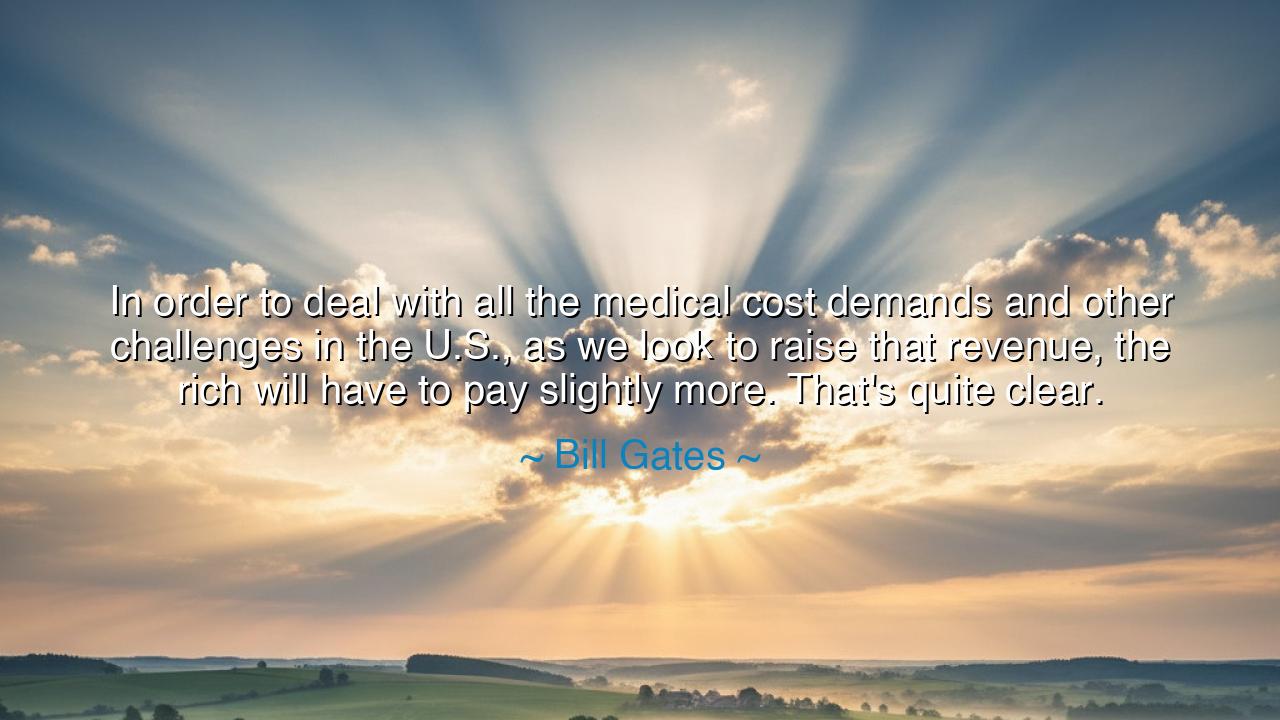
In order to deal with all the medical cost demands and other
In order to deal with all the medical cost demands and other challenges in the U.S., as we look to raise that revenue, the rich will have to pay slightly more. That's quite clear.






Hearken, O seekers of balance and guardians of justice, to the words of Bill Gates, who declared: “In order to deal with all the medical cost demands and other challenges in the U.S., as we look to raise that revenue, the rich will have to pay slightly more. That's quite clear.” In this utterance lies a truth both economic and moral—a reminder that prosperity carries responsibility, and that those who have gathered much must also give more for the common good. Gates, himself one of the wealthiest men of his age, does not speak from envy or resentment, but from wisdom born of observation: that the strength of a society depends not on the abundance of a few, but on the well-being of all.
From the dawn of civilization, nations have wrestled with the question of fairness and contribution. The rulers of old understood that wealth was not an end in itself but a trust, a sacred stewardship of resources meant to sustain the whole. In the ancient cities of Mesopotamia and the republics of Greece, taxes were seen not as punishment but as the price of order, health, and progress. Yet in every age, those blessed with fortune have been tempted to cling too tightly to their gold, forgetting that the prosperity of the individual cannot endure without the prosperity of the many.
Gates’s words arise from a modern truth that echoes the wisdom of the ancients: when a nation faces the burden of healing its people, the duty of care falls upon all—but not equally. For the wealthy stand taller upon the shoulders of society; they build their empires upon the labor, creativity, and consumption of millions. Thus, when the nation weakens under the weight of medical costs and inequality, those with the most must strengthen the structure from which they have benefited. To pay slightly more is not oppression—it is gratitude in action, the recognition that one’s success is intertwined with the health and dignity of others.
Consider the example of Andrew Carnegie, the great industrialist of the 19th century. Having amassed immense wealth through steel, he later declared that “the man who dies rich dies disgraced.” In his final decades, he devoted his fortune to the building of libraries, schools, and universities—institutions that empowered generations. His philanthropy embodied the truth Gates now repeats: that wealth unused for the betterment of society becomes corruption of the soul. Just as Carnegie’s libraries became temples of learning, Gates envisions a world where taxes, wisely applied, can become instruments of healing and equality.
The call for fairness is not new. In the scriptures of many faiths, it is written that the measure of the just is not how much they possess, but how much they share. Economic justice is not the destruction of wealth, but its transformation into nourishment for all. A nation that allows its poor to sicken while its rich flourish in excess decays from within. The physician cannot heal one limb while the rest of the body festers; so too, a country cannot thrive while its people languish without care.
The lesson is luminous: to sustain a people is the highest form of patriotism. When those with abundance contribute more, they do not lose—they preserve the stability, harmony, and moral strength of the nation that made their abundance possible. Gates’s vision is both practical and spiritual: to ensure that prosperity circulates, that the flame of progress burns for all, and that the blessings of innovation and medicine are not reserved for the few, but shared among the many.
Practical wisdom flows from this understanding. Let the wealthy embrace their duty not as a burden, but as an honor; let citizens hold their leaders accountable for using those funds justly; and let all people see that the health of a nation is its truest wealth. To contribute toward that health—whether by tax, labor, or service—is to strengthen the foundation upon which civilization rests.
O seeker of understanding, remember this: the greatest wealth lies not in what one keeps, but in what one gives. Let the words of Bill Gates remind you that prosperity divorced from compassion becomes decay, but prosperity guided by fairness becomes greatness. For in the balance between the strong and the weak, the rich and the poor, the giver and the receiver, lies the enduring harmony of humankind.






AAdministratorAdministrator
Welcome, honored guests. Please leave a comment, we will respond soon